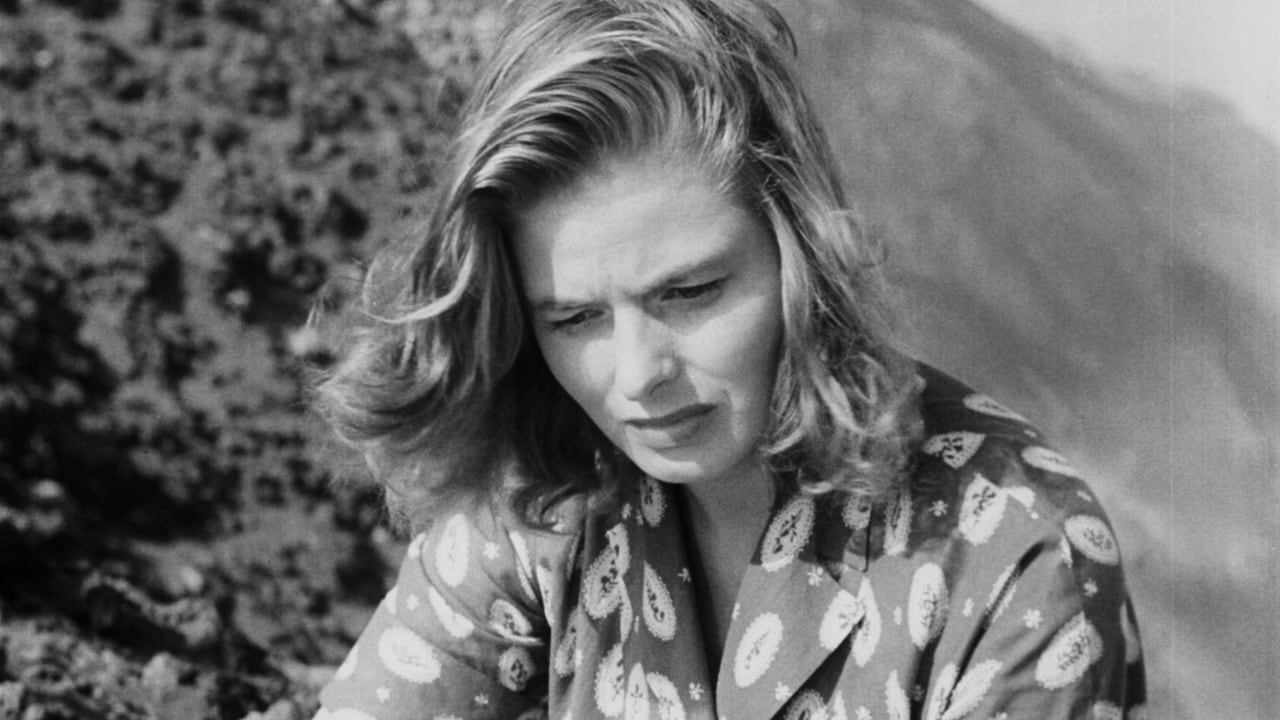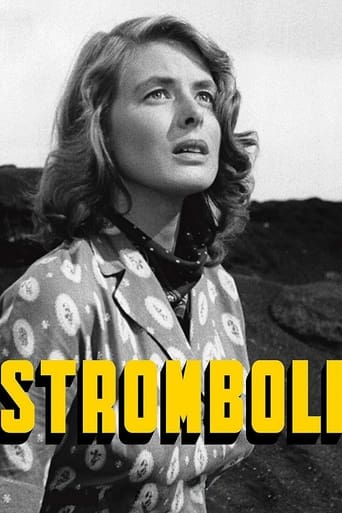WasAnnon
Slow pace in the most part of the movie.
Dorathen
Better Late Then Never
Roy Hart
If you're interested in the topic at hand, you should just watch it and judge yourself because the reviews have gone very biased by people that didn't even watch it and just hate (or love) the creator. I liked it, it was well written, narrated, and directed and it was about a topic that interests me.
Payno
I think this is a new genre that they're all sort of working their way through it and haven't got all the kinks worked out yet but it's a genre that works for me.
cinemajesty
Smoke waves run over the opening credits. Karen, performed by Ingrid Berman is standing alone under war refugees in the barracks for females. She talks to a man through barbwire in bomb-out backyard. The man wants to kiss through the barbwire and gets cut in it. This is how "Strombolli" produced by Roberto Rossellini in 1949, opens its curtain towards a journey of a woman, who does not belong and finds a life, dancing on a volcano with the certainty of eventually eruption.Of course, Karen marries the infantile man Antonio. They set off by boat to the volcano island. When the couple arrives at the Island's shack, Karen realizes how much work needs to be done to create a kind of living. She lets herself be overwhelmed by despair of being imprisoned in a rotten cage. Direcor Roberto Rossellini masterfully build the following scene with his female protagonist encountering a boy playing in urban ruins.Karen's journey in a society microcosm of the isle follows more in encounters with a craftsman, a priest and the native women before her husband, starts working a fisherman to bring some money to the table, which is going to be in Karen's world never enough. She is different and apart, having no humility for herself. Karen seduces the priest eventually to love her. She fails, like a woman in metropolitan city looking for a shake-up as adventure in an isolated world.In a 2017 context, the film feels remarkably like an art-house version of the historical occasion of "Pompeji (79 A.D.)", which wants me to research on the Hollywood version from 2014.Nevertheless Roberto Rossellini keeps its character of Karen focused with witnessing a magnificent scene captured in 35mm live-action format of catching Tuna-Fish in an Italian cove, followed by Karen's pregnancy announcement, the volcano erupts. The evacuation of the Island begins. Karen holds a sleeping girl on her lap in a skiff under tight environmental conditions. She misses her chance to break away from Antonio, getting pulled back onto the island.The screenplay tightens its noose for Karen, who prostitutes herself to earn some money and organize her escape poorly with a route over the volcano. She loses all her luggage before Karen runs for complete exhaustion. With her whole body down in the black rock dust, she turns to prayer."Stromboli" is a picture of great simplicity in every sense. The director organized script-writing session to make it a razor-sharp script. It feels lean as a cheetah patiently crouching for its prey before the chase. The emotional journey for the spectator starts when the film is over. I'm writing this two weeks after my initial viewing. The emotional landscape sticks with the spectator. The majority of nowadays directors lack this kind of vision. Roberto Rossellini had the empathy and understanding of a universal human need and took to transcend over the medium film.© 2017 Felix Alexander Dausend
Turfseer
There's quite a bit of interesting history to 'Stromboli' that goes beyond the film itself. First of course was the scandal of star Ingrid Bergman shacking up with director Roberto Rossellini and having a child out of wedlock with him. Her reputation in the U.S. suffered until she made a comeback in 'Anastasia', winning the Academy Award for Best Actress in 1956. Then there was also the controversy over the international film rights to the English language version of the film which resulted in a court fight between Rossellini and RKO Pictures.The Criterion Collection features two versions, one dubbed in Italian and the English version which also contains some Italian dialogue. Ingrid Bergman plays Karin, a Lithuanian woman, who finds herself in an Italian camp for displaced persons after World War II. She marries an Italian POW, Antonio, who she meets on the other side of the barbed wire, separating the men from the women in the camp.The couple ends back up in Antonio's fishing village on Stromboli, a volcanic island, near Sicily. Karin, a high maintenance woman used to material pleasures, resents being on the island for several reasons. First off is the threat of death or injury from the volcano itself, which periodically spews boulders and volcanic ash on the hapless village below. Then there's the hostility of the villagers (particularly the remaining female residents) who chastise Karin for her lack of "modesty." Karin also has trouble with her husband Antonio, who she regards as a simpleton and unpolished. In one telling scene, he pits a ferret against a defenseless pet rabbit, which upsets Karin greatly. Antonio, on the other hand, finds this quite amusing.Karin doesn't help things for herself when she refuses to listen to the counsel of the village priest, who urges patience, until Antonio can make enough money so they can leave the island. Even worse is when Karin attempts to seduce the priest, which alienates him greatly. Later, Karin flirts with a lighthouse keeper in front of the villagers, which damages her reputation further.Rossellini used the village locals in most of the scenes. Some of them apparently had spent some time in the U.S. and came back to Stromboli in their later years. As a result, a few are able to speak some English. The scenes where the men are helping Karin and Antonio to fix up their home, felt believable, but I wondered if the scenes of outright hostility by the local populace (particularly the women), wasn't simply an example on Rossellini's part, of forced drama (after all, if the real-life villagers were so hostile to the idea of a narrative that features an interloper that they can't stomach, would they have actually agreed to participate in the film itself?).Perhaps the best aspect of the film is the on-location cinematography, particularly the excellent scene of the fishermen hauling in the tuna. Karin is juxtaposed with the big fish catch, as she is depicted as a person alienated from nature. Only when she gets into a direct confrontation with nature (after attempting to escape the island and threatened by the volcano) does she finally have an epiphany, accepts her situation and realizes that her arrogant stance, is untenable.The role of Karin is an unusual one for Ingrid Bergman, as the protagonist here is not exactly very likable. In one respect, the part reflects Bergman's situation in her own life during that time. In marrying Rossellini and now living in his world, she had to fit into a completely different culture then where she came from.I'm on the fence as to whether there's enough there in Bergman's role of the dissatisfied and stuck-up interloper who eventually finds redemption, to keep one's interest. Yes we 'get' the idea that she's alienated but her complaints go on for a little too long. Nonetheless, 'Stromboli' has all that local 'color' featuring the real-life inhabitants of the island as well a few dramatic scenes which will definitely keep your attention (the volcano eruption, the big tuna catch, etc.). The Criterion Collection also has a number of extras worth watching, including an interview with a prominent Italian film critic.
tedg
I have a special interest in films where the filmmaker is directing a woman he is in love with, often freshly in love. This is a rather iconic example because of the publicity surrounding its release, together withe critical rejection. Usually you can see the way the film is bent because of the love. This case is different. Its the actress that bends to the filmmaker, who has some very bad artistic intuitions. Oh, the philosophy of real narrative in a close-to-real container is well enough. Its a clean ideal, simple to describe. When it works you get the effect and you understand its effectiveness at the same time. Unfortunately, that effectiveness is rather blunt, of the kind a fishmonger would form. Since the method and the conveyed effect are linked you get films that when they work, are effective and comprehendable, but don't matter.This one doesn't even work. Sure it has a real village and villagers, real volcano and real fishing activity. I suppose it also is genuine in its depiction of lives and the church. But it seems random. Like a dogma picture — a similar manifesto — the real to purity compromises what matters. There's only one false episode in this, meaning one episode where it deviates from the realist ideal. It happens to be for me the only part that touched me.Its when the wife has decided to leave at any cost, that moment when she sits down in front of what would have been a dressing table in a better world. She is flustered and unsure, but determined. She — Ingrid — demonstrates this. Its acting of the highest order. It fits nothing before or after in tone because for that brief moment she escapes reality to show us what is going on inside her. This would not be how it would appear in reality, but in that case we wouldn't see or know anything. Here she acts and we see truth. Its the only place where we do.There are two other noteworthy things here that I caught.The first is that the story has some tentative shape that wants to emerge. Something not followed but indicated: a lover who isn't there for anything but escape. We learn at the end, after we know that she is seriously beset, that she is pregnant. The revelation may have been simply that the actress really did become pregnant and in the service of realism it was inserted. But there's a tantalizing reverse invented narrative that we can glimpse about the handsome fisherman who she secretly meets. Is he the father? Its counter to the world of the story, which simply grinds along. But its an attractive feature. The other interesting thing is how Rossellini has decided the world works. Its against us. Society is, the church is, nature is, individuals all are. We are trapped in a pinball machine of forces that simply don't care and its random what punishment you get for being alive. Its hard to see how Ingrid could have been attracted to such a man, and enlist to help him draw this for others. She does so not just in this film, but in a personal life she built with this man, stirring up unnecessarily hostile reporting on what otherwise would have been a simple romance. She becomes pregnant in two worlds.Ted's Evaluation -- 2 of 3: Has some interesting elements.
Ray Newby
Having spent a recent holiday on the Aeolian Islands this was a film I was very eager to see. I wasn't disappointed as I thought it was great. The film looks a little dated now though but in the early fifties would have been very good. If this film was made today there is no doubt today's special effects would certainly enhance the volcanic eruption scenes no end. The Tuna fishing scene was also very interesting but not for those of a squeamish disposition. The acting was first rate from both Ingrid Bergman and Mario Vitale. I was particularly interested in seeing this film after seeing the house on the island where Roberto Rossellini and Ingrid Bergman had stayed whilst this film was being made. A plaque on the property bears witness to this. All in all a very good film that I would recommend to anyone.

